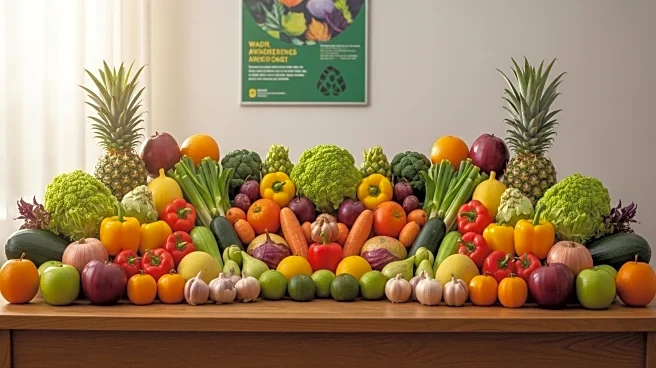What's Happening?
Agriculture Minister Alois Rainer has highlighted the significant issue of food waste in Germany, noting that nearly 11 million metric tons of food are discarded annually. This revelation comes ahead of a national awareness campaign titled 'Too good for the bin,' aimed at reducing food waste. According to the Agriculture Ministry, 60% of this waste originates from private households. The campaign seeks to address the widespread overproduction and oversupply of food, which leads to premature disposal of items nearing their expiry dates. Despite the illegal nature of retrieving discarded food from refuse bins, it remains a reality for many in need. Previous attempts to partially legalize this practice were unsuccessful due to the lack of consensus among Germany's 16 states.
Why It's Important?
The issue of food waste in Germany has broader implications for resource management and environmental sustainability. Reducing food waste can significantly impact the country's ecological footprint by conserving resources and minimizing landfill contributions. The campaign underscores the need for collective action to address overproduction and consumer habits that contribute to waste. This initiative could influence public policy and consumer behavior, encouraging more sustainable practices. Additionally, addressing food waste can alleviate social issues, as it highlights the disparity between food availability and accessibility for those in need.
What's Next?
The 'Too good for the bin' campaign is set to launch its first events this weekend, aiming to raise awareness and promote action against food waste. While no new legislative initiatives are currently planned, the campaign may stimulate discussions among policymakers and consumer organizations about potential regulatory changes. The success of the campaign could lead to increased pressure on the government to revisit the issue of legalizing the retrieval of discarded food, potentially fostering a more unified approach across Germany's federal system.
Beyond the Headlines
The campaign not only addresses environmental and economic concerns but also touches on ethical dimensions related to food security and social justice. By highlighting the illegal yet prevalent practice of retrieving food from refuse bins, the campaign raises questions about societal responsibility and the need for systemic change to support vulnerable populations. Long-term shifts in consumer attitudes and government policies could emerge from this initiative, promoting a more equitable and sustainable food system.








